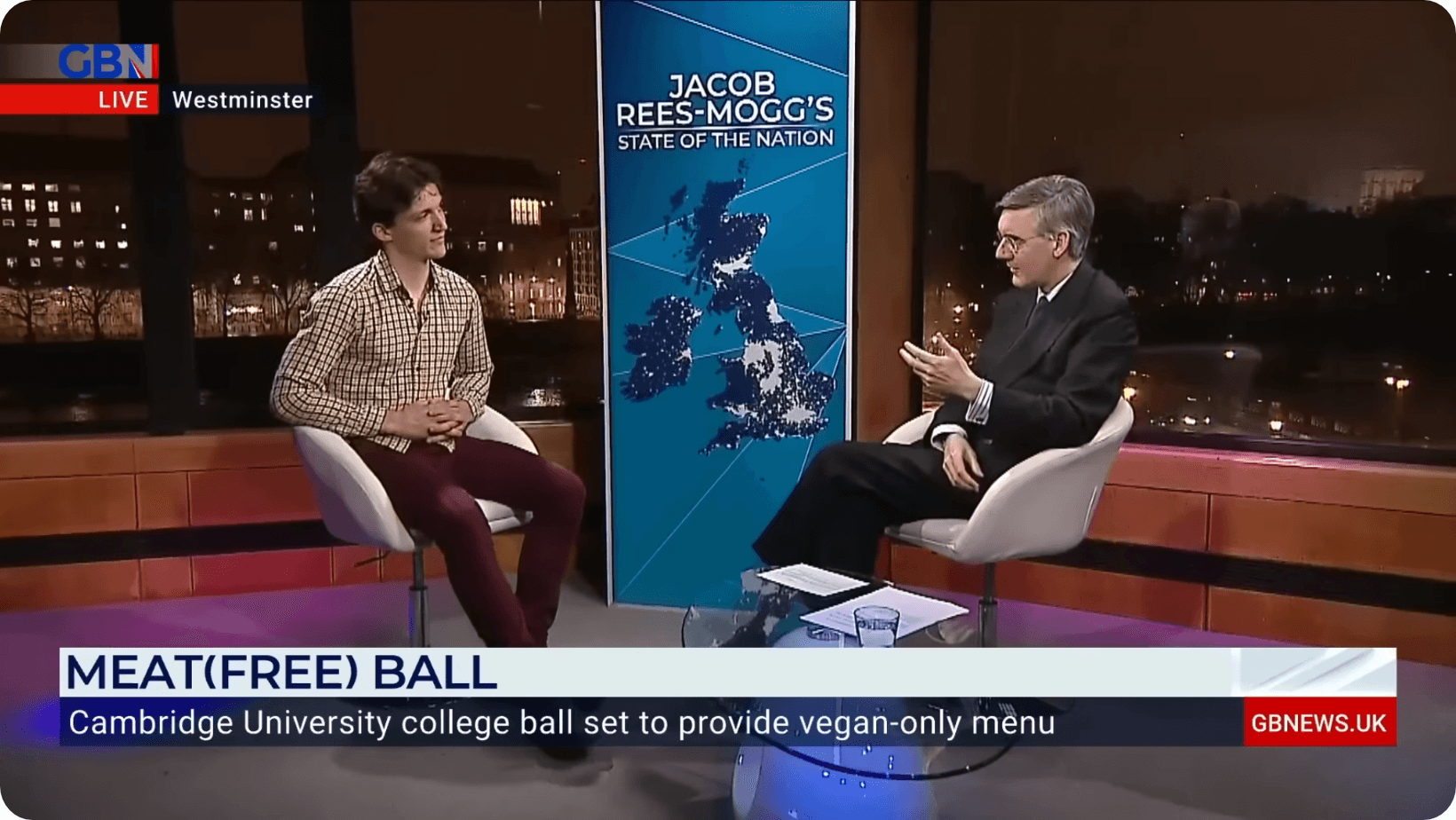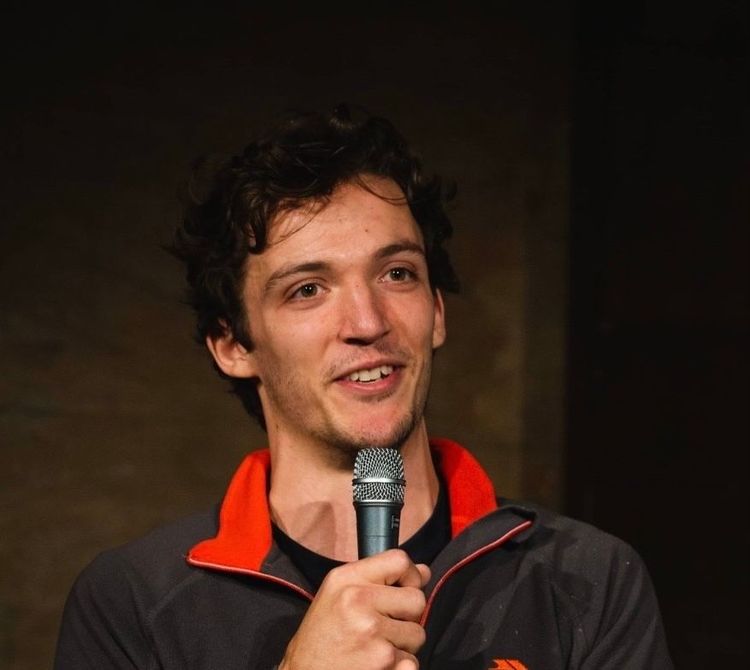Rory Cockshaw: Creating a more vegan world, one laugh at a time
This Is Not A Game, the world’s first vegan boardgaming company, is the brainchild of Rory Cockshaw, developed to help broach difficult topics (such as veganism) in easy ways.
Rory has campaigned for Viva!, been Podcast Manager for Animal Rising, and went head-to-head with Jacob Rees-Mogg on GB News (which he spills the tea on). Currently, he is Founder’s Associate for Omni and gives his insights on the future of vegan pet food below. So without further ado, let’s dive in.
V-Land UK (V-L): What inspired This Is Not A Game? And when is the official launch date?
Rory Cockshaw (RC): The first game, Plants Against Veganity, is launching this July. It takes a tongue-in-cheek approach to common vegan tropes. The flagship card game is designed to make vegans and non-vegans find a little relief in what can be an emotionally fraught topic.
Plants Against Veganity, inspired by classic after-hours party games, will also be perfect for helping activists unwind after events, or breaking down vegan-related barriers between friends and family.
The inspiration for This Is Not A Game came in August 2023; my girlfriend Issy and I were playing Monopoly, and I realised you could make a fun, climate version of Monopoly - this was the first idea and the way the company developed.
Even though we didn’t develop that game idea further, it made me realise you could twist games to make them more useful and educational around the climate and veganism. I wanted to combine those two elements and create board games and card games, funny things that make people smile, but also made people think. Because I think one of the best ways of making people think, is by making them laugh and smile.
I’ve learned from many hours of doing street outreach that being more approachable and making people laugh breaks down any barriers; if games can do that for you, that’s a really useful tool - it’s not just a game. And that is why it’s called This Is Not A Game. It’s not saying what happens to animals is funny; it’s just highlighting some funny things about vegans and it makes us more relatable.

Isabel Acosta
V-L: You refer to yourself as an ethical vegan who enjoys not taking things too seriously all of the time. Is this ethos reflected in This Is Not A Game? Would you say your approach to encouraging veganism aligns with ‘carrot, not the stick’?
RC: I suppose. I think I’ve been through the ringer a bit, as perhaps most vegans have. When I first went vegan, I was very much an ‘angry vegan,’ and difficult to talk to. As the years have gone by, I don’t think that approach works and tends to create division.
If vegans and non-vegans can have conversations where we make fun of one another and neither of us go home offended, we show that we trust each other.
By taking the mickey out of each other and ourselves there’s trust there that we’re not actually going to do you any harm. And they’ll have a good memory of their interaction with me as a vegan. People don’t really remember what you say, they just remember the way you made them feel.
V-L: When did you become vegan and why? Do you feel doing a degree in Natural Sciences had anything to do with it?
RC: I went vegetarian in 2019. After about six months as a vegetarian, Alex O’Connor did a talk at my university. I couldn’t refute any of his points, and combined with the void left by abandoning my religion and becoming an agnostic atheist, I went vegan early 2020 in my first year at uni.
A lot of my justifications for veganism are actually built on evolutionary theory and evolutionary biology. It was an interesting, broad-ranging degree which enabled me to be able to attack things from every angle and offer some justification in tackling carnist arguments.
V-L: This broad range of knowledge came across when you appeared on Jacob Rees-Mogg’s GB News show. How was that experience for you?
RC: I’m still dining out on the story to this day! It was nowhere near as scary as I thought it was going to be. Politics aside, Jacob was very personable and polite. It highlighted the power of comedy - I find some of his jokes funny and he was laughing along with mine also, such as asking if I could get a lift back in his limo which he took graciously and laughed off. It really broke down the barrier between us.
He was probably expecting me to come on and be aggressive and hateful towards him and for it to be a shouting match. And then I went on and opened by speaking to him in Latin, made a few jokes on and off camera, and we had a good time and a nice conversation.
Quite a few comments below the video of our chat were supportive of me. It plants a seed that not all vegans are the way they assume vegans are going to be. This aligns with the philosophy behind This Is Not A Game: not all vegans are who you think they’re going to be, we can make fun of ourselves, we can have good conversations, we can bond with people we thought we may not initially - Jacob Rees-Mogg is a perfect example of that.

GB News
V-L: What changes do you envision in the vegan pet food market over the next 5-10 years?
RC: Massive changes and huge opportunity in this market. There’s a lot going on at Omni. There’s so much more interest in plant-based pet food for dogs and cats. (Cats are more contentious due to certain vitamins and minerals that are much harder to get etc.) For dogs, it’s super easy to go vegan.
I’ve got a 12-year-old dog. She’s been vegan for about five years and recently hiked 60 km around the Gower Peninsula in Wales. That’s not a dog suffering the ill effects of protein deficiency or anything like that! She’s so active and energetic. The oldest ever dog in the UK lived to 26 years old on a vegan diet.
There’s so many brands of vegan pet food and I’m constantly discovering new vegan/vegetarian brands. At Omni we’re launching cultivated chicken cat food. It’s not technically vegan, but there’s no slaughter involved and the opportunity cost compared to business as usual, is an absolute no brainer - the few cells taken from a chicken egg once can produce billions of kilos of ‘chicken meat.’
Cultivated meat is one of the most revolutionary things that could happen for animals, given that 1 in 5 animals is killed for the pet food industry globally. In my opinion, plant-based pet food is taking over the industry, so it’s a very exciting area to work in.

Isabel Acosta
V-L: You’re currently writing a book, Of Meat and Men - what is the main premise and what do you hope its impact may be?
RC: My dissertation at uni was on the history of feminism and the animal rights movement, which are incredibly interconnected. I noticed when looking at the team that members of most animal rights or vegan-related organisations are about 90% female (by no means a bad thing, but where are all the men, beyond some higher profile members in the vegan movement?). Only 1 in 7 people in any given year taking part in Veganuary are male.
The central question of my book is: Why is it so unmanly to be a vegan?
The book is trying to tease apart all sorts of historical, philosophical, and sociological contexts: Why is veganism so set in these fixed gender role ways? And what is it in the particular troubles that men face when going vegan that we can quite easily break down by reframing how we see and communicate some things?
I think also, this is partially where the comedy approach comes in - men do like to make fun of stuff; if you get six men to hang out, it’ll be about four seconds before one of them starts roasting another one of them. So, that’s where veganism comes in - actually being able to make fun of ourselves might make us more appealing to men who don’t like taking stuff too seriously.
